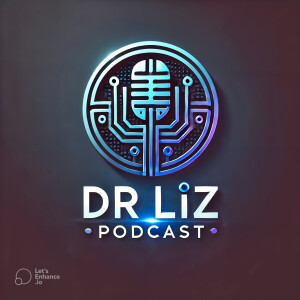Deep Dive into Nursing Education topics using AI
This podcast explores topics important in nursing education. The ”Deep Dive” conversation is generated using an AI-tool, with content developed from peer-reviewed journal articles or other articles on topics of interest to nurse educators. The intent of this podcast is to facilitate reflective thought among nurse educators on relevant and current topics within nursing education.
Episodes

4 days ago
4 days ago
Exciting new research alert! Recently read "Sentience and Experiential Learning: The Role of the Senses in Learning" by Stock, Cola, and Kolb (2025), which explores how our eight senses contribute to holistic learning experiences. This deep dive discusses findings, but also how this research applies to simulation-based learning. As healthcare education evolves, this research suggests we need to balance conceptual knowledge with perceptual experience. In healthcare simulations, this means consciously engaging with sensory details. The implications for creating more immersive learning environments are profound. By designing simulation spaces that optimize sensory engagement, we can foster deeper empathy, enhance presence, and build the foundation for clinical intuition.
Read full eBook: https://learningfromexperience.com/books/sentience-and-experiential-learning/

Sunday Apr 20, 2025
Sunday Apr 20, 2025
This Deep Dive discussion summarizes some of the information from the recent report from Gallup, Walton Family Foundation and GSV Ventures, "Voices of Gen Z: How American Youth View and Use Artificial Intelligence," which explores the perspectives of individuals aged 13 to 28 regarding AI adoption in the United States. The focus for this discussion provides a perspective of how these findings of this report might support efforts of AI integration in nursing education. Full report found at Walton Family Foundation-Gallup Gen Z Research Hub

Monday Apr 14, 2025
Monday Apr 14, 2025
This Deep Dive takes a look at Chapter 3 – “Responsible AI” of the AI Index Report 2024 published by Stanford University. The discussion highlights several key takeaways concerning the development and deployment of artificial intelligence, particularly large language models (LLMs). These insights can be particularly helpful for educators in higher education as they prepare students to navigate an increasingly AI-driven world. Full report found at https://hai.stanford.edu/ai-index/2024-ai-index-report.

Wednesday Apr 09, 2025
Wednesday Apr 09, 2025
NCSBN just released (April 2025) the 2024 RN Practice Analysis which assist NCSBN in evaluating the validity of the test plan that guides content distribution for the NCLEX-RN examination. This Deep Dive - Part 2 - addresses some key findings from Table 12 within the practice analysis. The discussion closes on how this analysis is applicable to nursing education. Link to the full research brief on the NCSBN website: 2024 RN Practice Analysis: Linking the NCLEX-RN Examination to Practice | NCSBN

Wednesday Apr 02, 2025
Wednesday Apr 02, 2025
NCSBN just released (April 2025) the 2024 RN Practice Analysis which assist NCSBN in evaluating the validity of the test plan that guides content distribution for the NCLEX-RN examination. This Deep Dive - Part 1 - addresses some key findings from Table 11 within the practice analysis. The discussion closes on how this analysis is applicable to nursing education. Link to the full research brief on the NCSBN website: 2024 RN Practice Analysis: Linking the NCLEX-RN Examination to Practice | NCSBN

Saturday Mar 22, 2025
Saturday Mar 22, 2025
Examining the transition of newly licensed nurses into professional practice is crucial for nurse educators for several key reasons. This deep dive pulled from 32 peer-reviewed articles focuses on several key aspects of the new graduate transition to practice which have emerged: gaps in the transition process and opportunities for nurse educators to enhance new graduate transition. Best practices are identified and what it means to be practice ready. Sources for Podcast: https://bit.ly/4hzfllY

Friday Mar 14, 2025
Friday Mar 14, 2025
This deep dive is the first part of a two-part series taken from the National Council of State Boards of Nursing (NCSBN) Environmental Scan (2019-2025) which is published annually in the Journal of Nursing Regulation. The discussion will highlight information within these publications which influence nursing and healthcare including workforce trends, education, healthcare delivery, technological advancements, and policy issues. Insights and data on the evolving landscape of the nursing profession, including RN and LPN/LVN employment numbers, are addressed, including emerging challenges.

Friday Mar 14, 2025
Friday Mar 14, 2025
This deep dive is the first part of a two-part series taken from the National Council of State Boards of Nursing (NCSBN) Environmental Scan (2019-2025) which is published annually in the Journal of Nursing Regulation. The discussion will highlight information within these publications which influence nursing and healthcare including workforce trends, education, healthcare delivery, technological advancements, and policy issues. Insights and data on the evolving landscape of the nursing profession, including RN and LPN/LVN employment numbers, are addressed, including emerging challenges.

Saturday Mar 08, 2025
Saturday Mar 08, 2025
This deep dive discussion pulls from themes from 15 peer-reviewed articles from Nursing Education Perspectives published from early 2023 until early 2025. Reflect on how these themes might translate to your own practice within nursing education. What are the challenges, but also opportunities with this new technology? Enjoy.

Saturday Mar 01, 2025
Saturday Mar 01, 2025
This deep dive addresses key factors which may contribute to the shortage, key challenges in recruiting and retaining nurse faculty and ways the nurse faculty shortage may be addressed. The discussion stems from the 2021 report available at National Advisory Council on Nurse Education and Practice (NACNEP) - Preparing Nurse Faculty, and Addressing the Shortage of Nurse Faculty and Clinical Preceptors.
